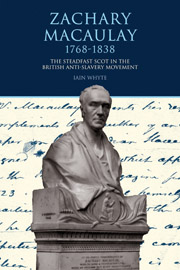Book contents
- Frontmatter
- Contents
- Foreword
- Acknowledgements
- Abbreviations
- List of Illustrations
- Chronology
- Introduction
- 1 From Inverary to the Sierra Leone River
- 2 Slave Traders and French Invaders
- 3 Captive in Love—to Selina Mills
- 4 The Trials of the Governor
- 5 Caught in a Multitude of Tasks
- 6 Clapham, Family and Friends
- 7 Attempting to Win France for Abolition
- 8 ‘Let Us Look it Up in Macaulay’—The Anti-Slavery Arms Manufacturer
- 9 Commerce and Conflict
- 10 Triumph and Tragedy on the Path to Glory
- 11 As Others Saw Him—As We Might Assess Him
- Bibliography
- Index
11 - As Others Saw Him—As We Might Assess Him
- Frontmatter
- Contents
- Foreword
- Acknowledgements
- Abbreviations
- List of Illustrations
- Chronology
- Introduction
- 1 From Inverary to the Sierra Leone River
- 2 Slave Traders and French Invaders
- 3 Captive in Love—to Selina Mills
- 4 The Trials of the Governor
- 5 Caught in a Multitude of Tasks
- 6 Clapham, Family and Friends
- 7 Attempting to Win France for Abolition
- 8 ‘Let Us Look it Up in Macaulay’—The Anti-Slavery Arms Manufacturer
- 9 Commerce and Conflict
- 10 Triumph and Tragedy on the Path to Glory
- 11 As Others Saw Him—As We Might Assess Him
- Bibliography
- Index
Summary
Contemporaries and Commentators
Robert Burns, who but for a stroke of financial good fortune might have had similar employment experiences in Jamaica to Zachary Macaulay, wrote the memorable lines, ‘O wad some power the Giftie gie us, to see oorsels as ithers see us’. Macaulay spent many hours of his life in self-analysis, sometimes torturing himself and often wearying his family and friends. In assessing his contribution to the cause which was so all-consuming in his life, it is necessary to look at what others have said of him.
‘I love you so well that I can truly rejoice you are that man of diligence as well as ability, though you shame me by such efficiency’, said Wilberforce. James Stephen wrote ‘take care of yourself dear friend, if only for the sake of our poor unfortunate cause. You are its sheet anchor’. Thomas Fowell Buxton told him that his sober estimate was that ‘you have done more towards this consummation [abolition of slavery] than any other man’ and told others that Macaulay was ‘the anti-slavery tutor of us all’.
Both of the published accounts of Zachary Macaulay's life bear the marks of hagiography. His granddaughter Margaret Holland, Viscountess Knutsford, in her extensive Life and Letters made stylistic changes to Macaulay's written material and omitted any passages which lacked what she judged to be noble sentiments. Her treatment of any critics was at times petulant. That may have been understandable in the case of the crude attacks of John Bull or James McQueen, but it smacks of over-defensiveness in other circumstances. Her final tribute to Zachary Macaulay is the one from James Stephen the younger, claiming that he ‘meekly endured the toil, the privation and the reproach, resigning to others the praise and the reward’. This was to be quickly replaced by the more balanced one that found its way as an inscription into Westminster Abbey. A generation later, Macaulay’s great grandson, Charles Booth, rejected any trait of character that implied anything less than perfection. His family life, wrote Booth, was ‘completely happy’, he never knew ‘low spirits’, his objectivity was total and bitterness and irritability alien to him. Indeed the Clapham Sect were termed ‘a selfless band’ whose unity was ‘never marred’ by ‘jealousy or the desire for personal distinction’.
- Type
- Chapter
- Information
- Zachary Macaulay 1768-1838The Steadfast Scot in the British Anti-Slavery Movement, pp. 242 - 249Publisher: Liverpool University PressPrint publication year: 2011

